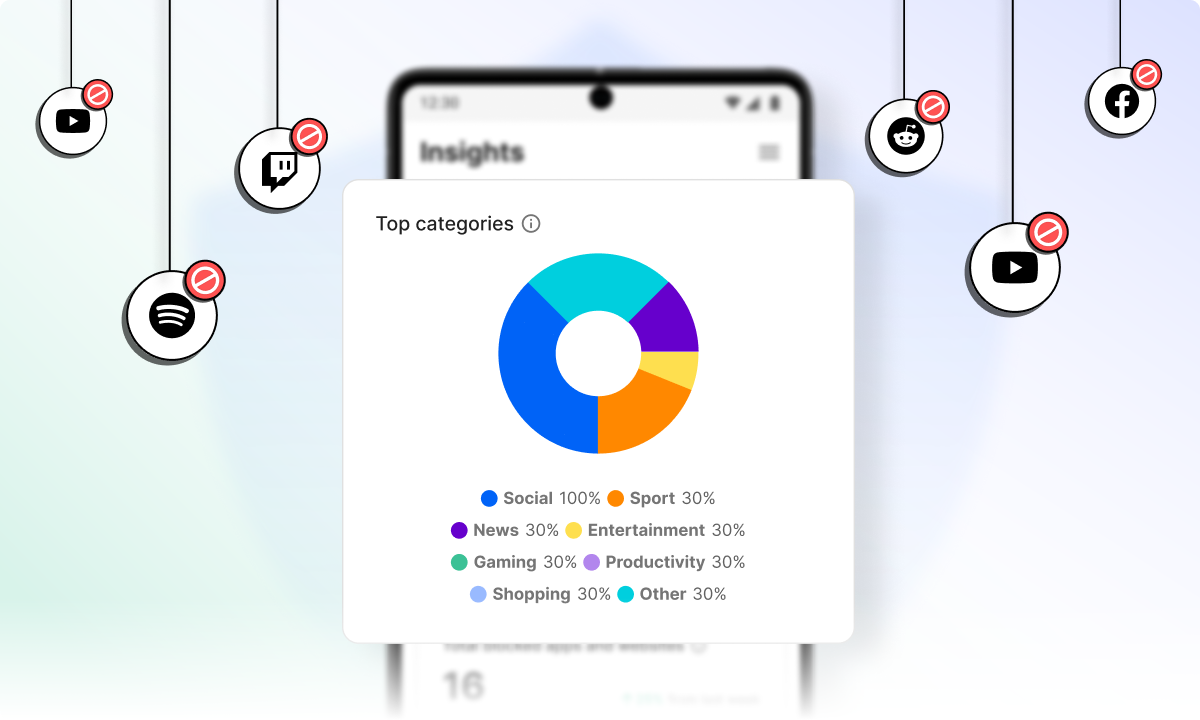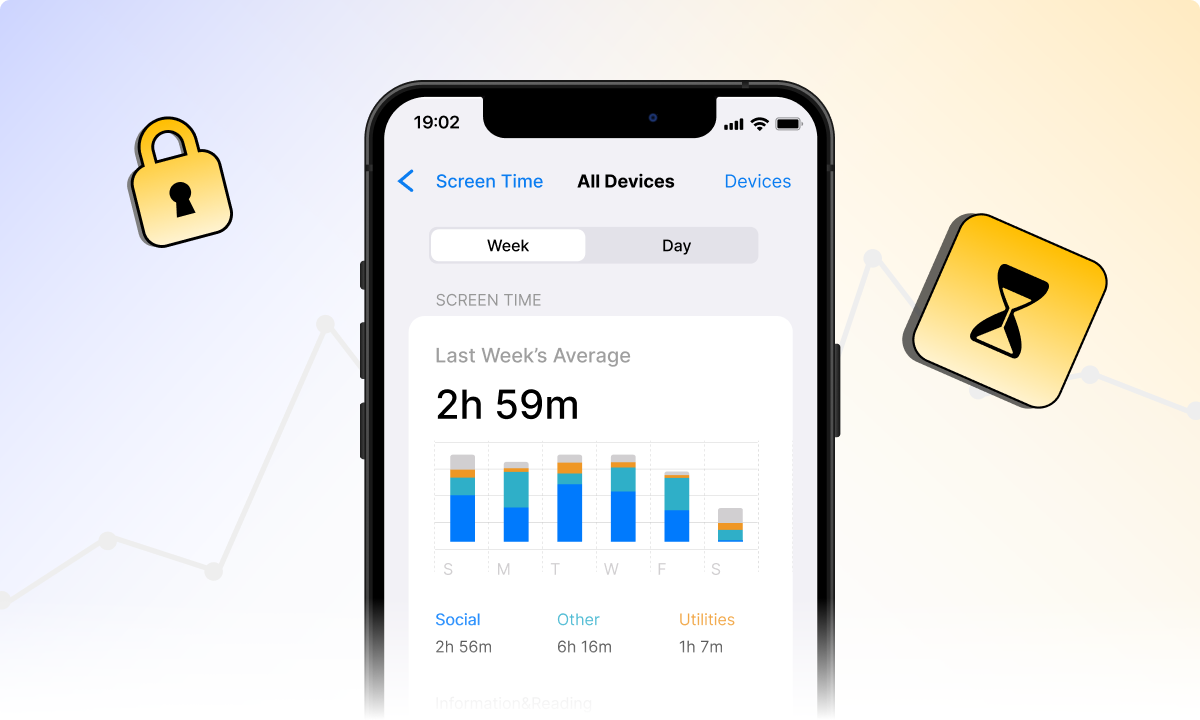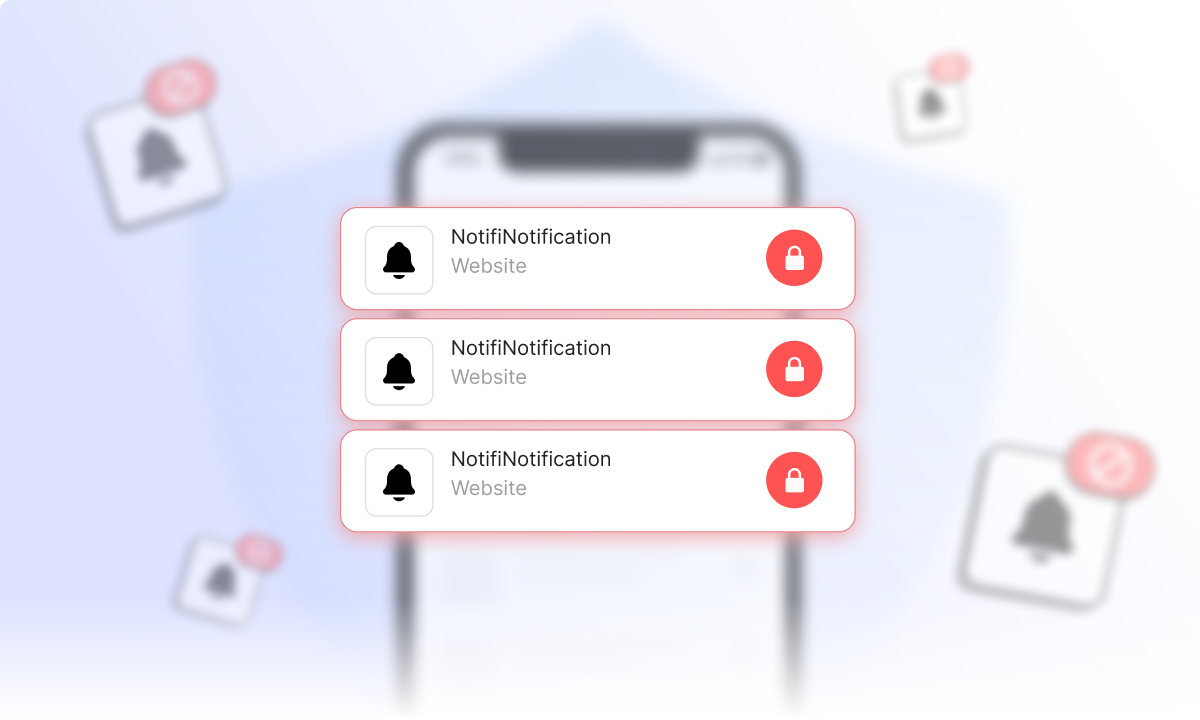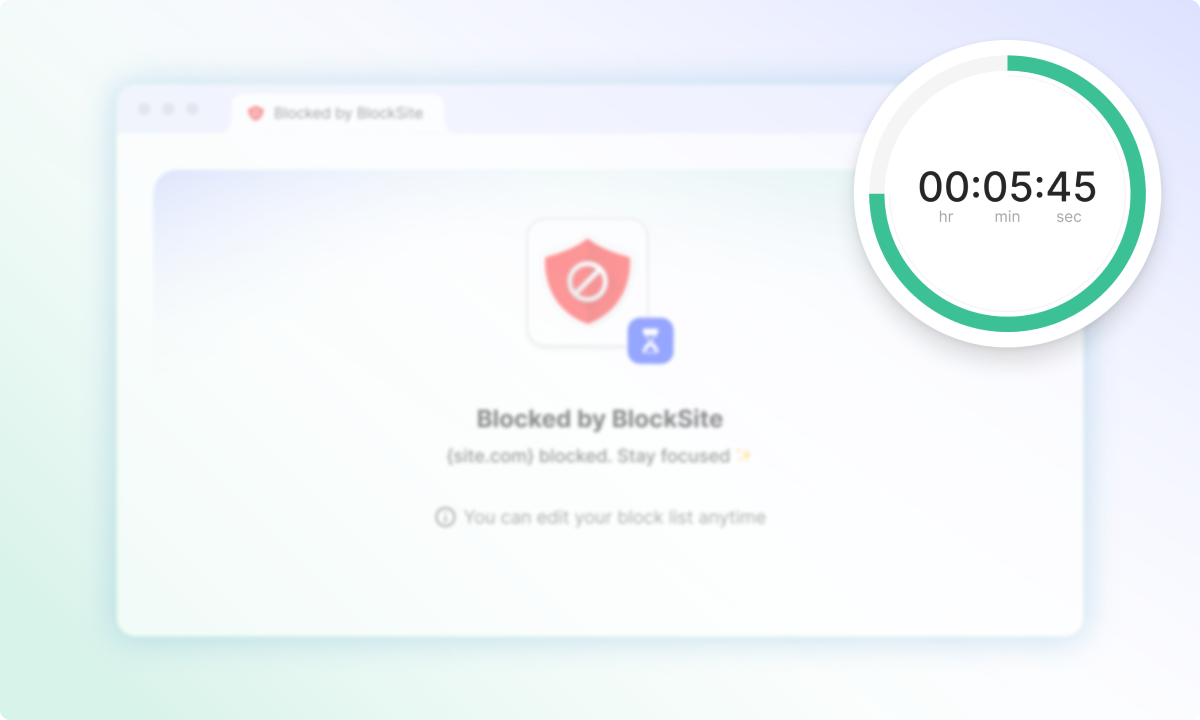Did you know that the average person touches their phone 2,617 times a day? With technology dramatically advancing each year, people are becoming more and more dependent on their devices. The rise of phone addictions are increasing at an exponential rate and the consequences are detrimental to your mental health, physical health, and overall quality of life. Continue reading to learn how to spend less time on your phone and avoid this from happening to you.
The consequences of too much phone time
Anyone and everyone is glued to their phone screen – it’s an issue everywhere! According to Common Sense Media, 50% of teens and 27% of parents feel that they are addicted to their phones. These statistics reflect how there is no age restriction – anyone can spend too much time on their phone. The harmful effects of too much screen time can be detrimental to your physical and mental health. Follow along below to understand the severe impact of wasting too much time on your phone.
– Mental health
Too much screen time has shown to have negative effects on mental health in various ways. Research has found that there is a direct correlation between phone time and sleep deficits. A 2013 study concluded that light from your phone screen suppresses melatonin which is the hormone your body needs in order to sleep. So being on your phone for too long in the evening can have harmful effects on your quality of sleep. There is also evidence supporting that phone time decreases memory ability. According to Addiction Center, research has found that the area of your brain responsible for memory, known as gray matter, can be negatively affected with too much screen time. There’s also research suggesting that being on your phone too much can affect your attention span. This seems to be apparent when you are trying to focus and your phone is out in plain sight, deterring your attention from what’s going on in day-to-day life activities and experiences. There is also research suggesting that excessive screen time correlates to ADHD in youth, thus phones impact people’s ability to focus in more than one way.
Another issue with phones impacting mental health is increased levels of anxiety and depression. There is lots of research discussing excessive phone usage and how it’s linked to anxiety and depression. A study from Northwestern Now stated that too much time staring at a phone screen leads to depression. Cellphones and social media are gateways to seeing other people’s lives. Not only do phones make it easier to compare yourself and your experiences to others, it removes you from living life which perpetuates the problem in the first place.
The more you look at a screen, the more you are taking away from being outside in nature, doing school, building human connections, achieving work tasks – doing basic human life necessities that help you avoid feelings of anxiety and depression. Excessive phone time has strong effects on your mental health, specifically sleep problems, weakened memory, short attention span, and increased anxiety and depression. Try to be aware of the time you spend on your phone each day and learn the best tips to limit your usage to protect your mental health.
– Physical Health
Excessive phone time can impact your physical health in various ways. When you are spending 4 plus hours on your phone everyday, you’re being taken away from possible physical activities that keep us healthy and in shape (and in-turn, help your mental wellbeing too). There’s much evidence suggesting that being on your phone too much can lead to weight gain and poor fitness ability. Healthy Day found that students who spend many more hours per day staring at a screen are substantially less fit than students who spend a limited amount of time on their phone. There’s also a connection between too much phone use and wrist pain and nerve damage. Wexner Medical Center found that individuals with preexisting nerve damage in their arms or hands can enhance their neurological issues by holding a phone too much. There’s a recent term that has been coined to describe hand and wrist pain from excessive phone usage – the text claw. The text claw is another type of physical health problem that results from being on your phone too much.
Lastly, another physical health issue that comes from phones is harm to your eyesight. The blue light from your phone screen can cause damage to your retina which is arguably the most important part of your eye because it plays the main part in allowing you to see. The more and more time you spend staring at a phone screen, the more chances you have of getting a physical health problem that can last for the rest of your life. The best thing you can do to avoid this is be aware of your phone usage and learn the best tips and tricks to spend less time on your phone.
– Daily Life
In addition to mental and physical health issues, excessive screen time interferes with aspects of your daily life such as harm to your personal relationships, feelings of isolation and insecurity, and poor school and work performance. Personal relationships can be affected by too much phone use; this is known as phubbing. Excessive use of phones can impact your daily life by making you feel alone and insecure. This can result from isolating yourself inside or tuning out people around you because you are too focused on your phone screen. Feelings of isolation and insecurity can also result from being disconnected from your personal relationships as well as increased levels of anxiety and depression. These thoughts and emotions are all linked together and can perpetuate one another; thus it is common to experience all of this from spending too much time on your phone.
Lastly, poor school or work performance may result from spending too much time on your phone. It’s very easy to get sucked into the online world and without even realizing, you’ve been scrolling on TikTok for 3+ hours! According to a study from the University of California, it takes 23 minutes to refocus after checking your phone. Whether it be while your teacher is talking in class, during a study session at the library, or paying attention to your boss in a meeting – a quick phone check deters your attention for much longer than you think. To improve your school or work performance and not let your phone harm your grades or your potential work promotion, find out below the best ways to be on your phone less.
Tips & tricks on how to use your phone less
As you have learned, the consequences of being on your phone too much can be very harmful to your overall health and quality of life. There are various tips and tricks on how to reduce phone usage. Follow along below and learn the most effective ways of how use your phone less.
– Track your screen time
A strong motivator to decrease phone usage is by checking and tracking your screen time. Apple and Android phones both have features that tell you your daily screen time, your average screen time over the week, and which apps you are using the most. The screen time feature is very useful for reducing your screen time because the results are often shockingly high, motivating you to initiate a change with time spent on your phone.
The screen time feature is helpful for helping you set, track, and reach a goal of spending less time on your phone. For example, let’s say your daily average screen time is 4 hours and you decide you want to cut this time in half, the screen time feature will help you stay on track of reaching your goal.
– Set aside your phone one day a week
A great trick to spend less time on your phone is simple: pick one day a week where you do not go on your phone. For example, let’s say you pick Sunday. Make a mental note, write it down on your calendar, or set a reminder in your phone that Sunday is the day you won’t be on your device. It may sound contradictory setting a reminder on your phone to not use your phone but this tip can actually be very helpful. Your initial reaction Sunday morning might be to scroll on your phone but on your lock screen, a reminder will come up to say “stay off phone”. A day a week offline is a useful stepping stone to getting you used to removing yourself from being glued to your smartphone.
– Keep your phone away from your bed
As we discussed earlier, being on your phone at night can impair your ability to have a good night’s rest. A very useful tip that can reduce sleep deficits is not having your phone in or near your bed. Your bed is meant for relaxation and rest and when you bring your phone and the “outside world” into your special place of rest it can be much more disruptive than you would think. A great step to reduce time on your phone is breaking the relationship you have of having your phone in bed.
– Utilize features in settings that reduce phone time
Androids and iPhones have many setting features that can help limit your phone time. These features include turning off notifications, setting a text auto-responder, turning on “Do Not Disturb”, turning on “Grayscale” feature, and creating a long passcode.
Notifications Off
In settings, you can control which apps you would like to receive or disable notifications from. Disabling notifications will remove the small red notification symbol that appears on the app icon. Turning off notifications for most if not all of your apps will make you less inclined to click and check your apps because it will remove incoming alerts and the red notification symbol.
Text Auto-Responder
Text auto-responder is a great feature that automatically sends anyone a reply-text saying that when you are able to, you will get back to them. A common stress of being off your phone is leaving many people “hanging” who are trying to get in contact with you. The text auto-responder can help remove this stress because it informs anyone who’s trying to reach you that you are not on your phone for the time being but will get back to them shortly.
“Do Not Disturb”
The “Do Not Disturb” feature allows you to control which notifications you would like to have muted on your phone. You are able to mute incoming phone calls from unknown callers or from your contacts as well. It also allows you to mute incoming notifications from social media apps (like Snapchat, WhatsApp, or Instagram) so that you do not see the alerts on your lock screen. “Do Not Disturb” also allows you to block text message notifications from appearing on your lock screen. Removing incoming notifications is great because it limits the temptation to check your phone because it does not show who is contacting you.
Grayscale
Enabling the Grayscale feature is a great way to trick your brain into wanting to check your phone less. Grayscale changes your phone screen to only white, gray and black. By removing all colors from your phone, it becomes less attractive to look at. Your brain is drawn to color and attractive things to look at, thus by removing color from your screen will help decrease phone usage.
Long Passcode/Disable Facial ID
Creating a long passcode and disabling facial identification is also a useful tool to limit phone usage. With advanced technology, facial ID makes it too easy to unlock your phone. By removing facial ID and creating a long password for your phone, you are making it less easy to unlock your phone which is helpful to limit screen time.
– Delete apps
Did you know that around 60% of apps downloaded on our phones are not used? There are so many unnecessary apps on our phone, so what is the point of having them? A useful trick to spend less time on your phone is by deleting all these unnecessary apps.
– Remove distracting apps from your home screen
In addition to the apps you don’t use, removing the distracting apps that you do use from your home screen is also so helpful to stop wasting so much time on your phone. Apps such as CandyCrush, Instagram, Snapchat, and so on might be popular apps you frequently use but aren’t actually providing any good to your life. They are time-wasting apps that remove you from the outside world and do not add much, if any, value to your life. By hiding distracting apps in folders or removing them from your homescreen, you are removing these apps from your direct and easy line of vision when you are on your phone. Instead of tumbling across these apps and clicking on them because they are in playing sight, now you will have to search for these apps if you would like to access them.
– Download an app blocker – BlockSite
One of the most useful tips to spend less time on your phone is downloading an app blocker such as BlockSite. BlockSite is an incredible productivity tool that helps limit time spent on your phone by blocking your access to distracting apps. Here are some of BlockSite’s most popular features for reducing screen time:
Schedule Feature
BlockSite’s Schedule feature is an amazing tool for reducing screen time. It allows you to block distracting apps on specific days and times of the week. For example, let’s say your screen time says you are most active on your phone during the evening and you also have noticed you have had trouble falling asleep. The schedule feature is perfect for you! All you need to do is block your most used apps for each day in the evening and you will no longer be able to access distracting apps so you will not scroll on your phone all night.
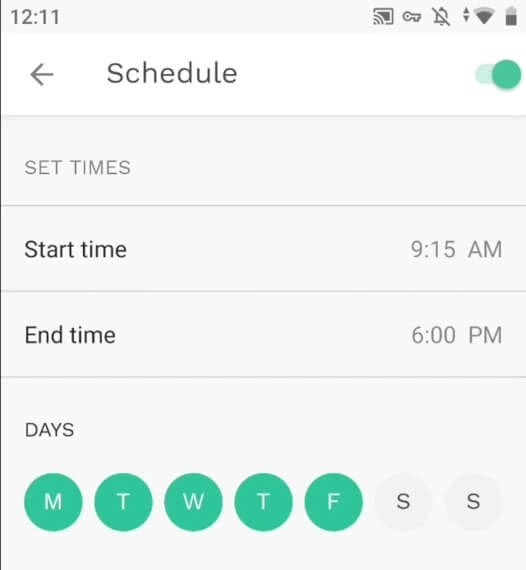
Block by Category
Category blocking allows you to block all sites and apps that fall under the same “category”. For example, if you find yourself scrolling on shopping sites or apps like AliExpress, Target, and Amazon and not only is this increasing time spent on your phone but it’s feeding into your shopping addiction, here is how category blocking with BlockSite can help you. You create a new category folder called “Shopping” and add all the shopping sites and apps you browse frequently. When you enable your “Shopping” category, BlockSite will automatically not let you access any of these apps.
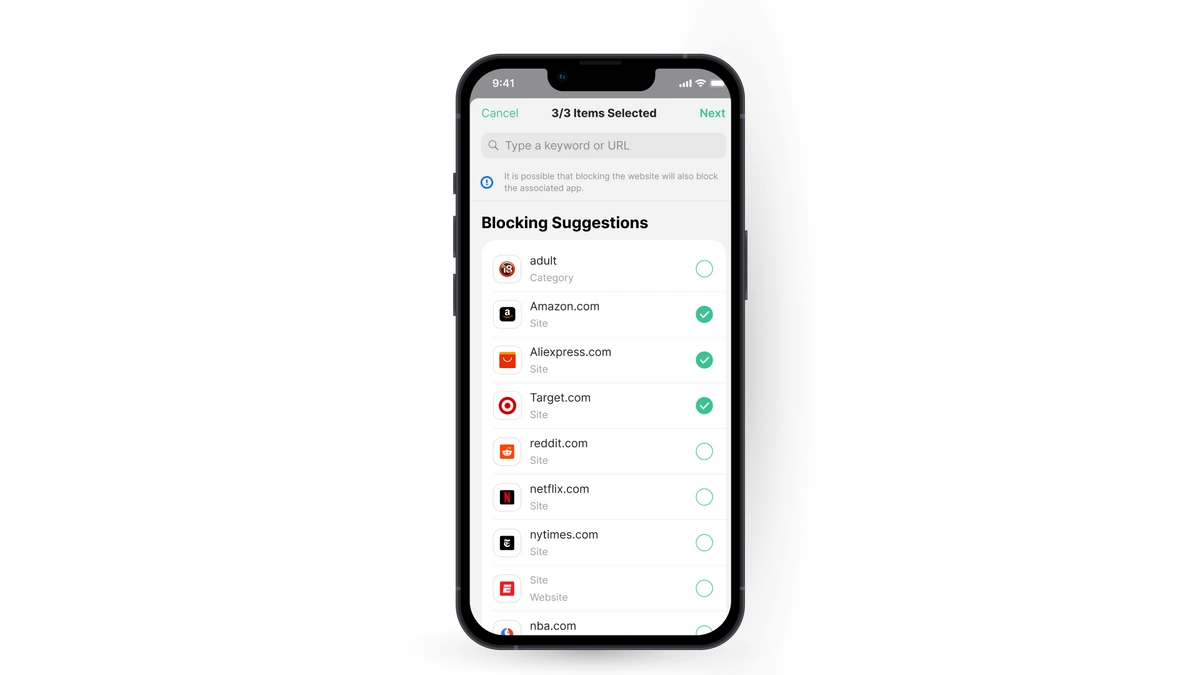
Site Redirect
Site redirect is a great BlockSite feature that redirects you to a different page when you attempt to access a site or app that you have blocked. A useful tip is to redirect your page to a reminder as to why you have the app blocked in the first place. For example, have your redirect page set to a blog about resisting digital distraction.
– Use other devices instead of your phone
Using other devices instead of your phone might sound counterintuitive at first, but it’s not what you think. We don’t mean other devices such as an iPad, Laptop, or Television, we mean devices that help with productivity and time management but don’t pull you away from reality. An alarm clock is a perfect example of another device to use instead of your phone. Having an alarm clock to wake you up is a great alternative to your phone because the first thing you do in the morning will no longer be touching your phone to turn off your alarm. An alarm clock also will help you with tip #3 we mentioned earlier: “keep your phone out of your bed”. Another alternative device would be to have a smart speaker like an Alexa. Smart speakers will answer simple questions for you and all you have to do is speak to it. Instead of checking your phone then potentially getting sucked into the online world, you no longer have to check your phone in the first place. An alternative device is great at reducing time spent on your phone because it takes away the first point of contact with your device that sucks you into being on your in the first place.
– Fill up your schedule
A way to decrease phone usage is by creating a plan of what you want to achieve and do in your spare time. The busier you are, the less time you have to distract yourself with screen time. Create a schedule where you do exercise, see friends, read a book, do school or career-related work, go on a walk, make a meal, and the list goes on and on. Fill up your time with productive and useful activities and you will naturally find yourself spending less time on your phone.
Stop wasting so much time on your phone Today!
Excessive phone usage has many consequences on your quality of life; the cons of its effect on your mental and physical health outweigh the pros of the comfort of texting people, watching videos, browsing social media feeds, or playing online games. Utilize the tips of reducing time on your phone such as using the setting features, not having your phone in your bed, creating a detailed schedule that will keep you busy, or downloading BlockSite to stop the temptations. Take control of your life by taking control of your screen time and be on your phone less.
FAQs
What are the consequences of being on my phone too much?
Being on your phone too much can lead to mental and physical health problems like sleep deficits, anxiety & depression, wrist pain, weight gain, and eye damage.
How to spend less time on your phone?
To spend less time on your phone, delete unnecessary apps, take advantage of many features in settings that can help limit phone time, download an app blocker like BlockSite, and create a busy schedule for yourself to keep you busy and off your phone.


